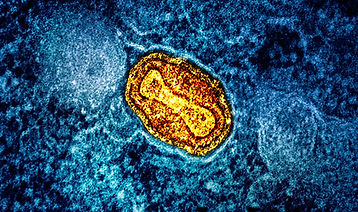
Health Portfolio
Researchers have mapped yellow fever virus in unprecedented atomic detail. Their findings explain how structure affects immunity and guide safer vaccine design.
Recent research shows strong links between NETs, microclots, and Long COVID symptoms. These findings may improve diagnostic accuracy using clear blood biomarkers.
A recent study challenges long-held ideas about the Black Death’s spread. The research shows how a fictional poem shaped centuries of misunderstanding.
A recent study reveals that T cells live in the healthy brain. These cells likely deliver real-time updates from the gut and fat.
A new study shows how Chagas disease spreads silently and becomes deadly over time. The parasite changes forms to survive in bugs and people.
Recent research suggests endothelial senescence may cause ME/CFS and long-COVID. This cell damage affects blood flow, immunity, and symptom persistence.
AS01-adjuvanted vaccines may offer unexpected protection against dementia. Their immune-boosting ingredients appear to activate brain-protective pathways.
H. pylori is a major, preventable cause of stomach cancer worldwide. Early detection and treatment could stop millions of future cancer cases.
A new study highlights the potential of skin fungi in fighting infections. The discovery could lead to new treatments that address antibiotic resistance.
Recent findings reveal that M. lepromatosis existed in the Americas millennia ago. The research challenges long-held beliefs about leprosy’s arrival and evolution.
A recent study suggests COVID-19 disrupts gut and immune system pathways. These effects may lead to lasting inflammation and intestinal leakiness.
Preschoolers are widely exposed to harmful chemicals from everyday products. Many of these toxins are unregulated and found at high levels.
Superbugs can evolve inside the body during treatment. Real-time genomic tracking can help doctors respond to these changes faster.
A new study in Science identified piperacillin for treating Lyme disease. Piperacillin, related to penicillin, best eliminated Lyme-causing bacteria, Borrelia burgdorferi.
Mitochondria help neutrophils sense bacteria and launch targeted immune traps. This discovery reveals new ways to treat both infection and autoimmune disorders.
A recent study confirms that most Oropouche symptoms appear within 3 to 4 days. Almost all patients develop symptoms within 15 days of exposure.
The shingles vaccine may offer protection beyond preventing painful rashes. By reducing inflammation and viral damage, it may help lower heart and brain risks.
H5N1 bird flu continues to spread across animals and into humans. A new vaccine shows strong protection in early lab studies.
Gepotidacin, a new antibiotic pill, works as well as standard treatments for gonorrhea. The new drug could offer a simple oral option for treating this common sexually transmitted infection.
Candida auris is spreading fast and becoming harder to control. It poses serious risks for patients in hospitals and long-term care
Walking pneumonia is a common, mild illness that can still disrupt daily life. Cases are rising, especially among children, due to various contributing factors.
Flu season is still upon us, but vaccines and precautions can help. Experts urge people to get vaccinated and take preventive measures.
The H5N9 outbreak in California marks a new development in U.S. bird flu cases. Surveillance and biosecurity measures will be key in preventing further spread.
A recent study confirms that regular exercise lowers risk of disease and early death. Even small increases in activity provide major health benefits, especially for inactive individuals.
A recent study found that the COVID-19 pandemic harmed social cognition in young children. False-belief understanding declined, especially for children from lower-income families.
Measles is spreading in Texas and New Mexico, with cases rising fast. Low vaccination rates have made outbreaks more common and dangerous.
Plastic exposure may increase heart disease risk by affecting gut health. This study found plastic triggers inflammation, oxidative stress, and heart tissue damage.
Since the emergence of COVID-19, there has been a sharp increase in ME/CFS cases. Many patients now face long-term disability with no clear treatment.
Measles is spreading again due to falling vaccination rates. Misinformation and policy changes are weakening public health protections.
Bird flu continues to spread among animals, raising concerns for humans. Experts warn that mutations could increase the risk of human-to-human transmission.
TB remains one of the world’s deadliest infectious diseases today. Its rise demands early detection, public education, and global cooperation.
Tanzania’s Marburg outbreak remains a serious public health threat. Officials are tracking cases, improving testing, and considering experimental treatments.
Declining vaccination rates in the U.S. threaten public health across all ages. Diseases like measles, mumps, and polio could advance without strong vaccination policies.
Understanding how cold weather affects health can help prevent illness this winter. Simple habits like washing hands and getting vaccinated will protect yourself and others.
Dengue fever is the world’s fastest-spreading mosquito-borne virus. Its range has extended drastically over the last six decades. Much of this transformation is the result of climate change.
The latest outbreak bird flu raises alarms due to its rapid spread and high lethality rate. It has caused significant harm to agriculture and wildlife.
Mosquitoes spread some of the most devastating diseases in the world. Wolbachia-infected mosquitoes promise a unique solution which could revolutionize global disease resistance.
Summer flu is a viral infection like the flu seen in colder months. Flu-like symptoms in summer could also indicate other illnesses.
Researchers are noticing alarming trends with mpox, previously known as Monkeypox, in 2024. A more acute variant of the virus is spreading to previously unaffected regions.
Despite the effectiveness of HPV vaccines, awareness of them remains low. Doctors must promote the vaccine broadly.
The initial findings that linked human DNA evolution to plague survival were exciting.
But recent studies question these earlier claims.
Ending TB requires urgent funding and global cooperation. TB’s deadly toll demands immediate attention from international and local leaders.
Ending TB requires urgent funding and global cooperation. TB’s deadly toll demands immediate attention from international and local leaders.
Egypt’s malaria-free certification marks a milestone after nearly a century of efforts. Yet, the fight against malaria continues worldwide, with millions still at risk.
Get vaccinated and keep your boosters up-to-date to protect yourself and your community. As cases continue to rise, it’s crucial to curb the spread of whooping cough.
Global heat levels are climbing, threatening both public health and environmental security. While global efforts offer hope, protecting vulnerable populations will require consistent action.
The fight against TB is winnable, but only with global action and investment. Every step today could save millions tomorrow.
As bird flu spreads and mutates, its danger to animals and humans increases. The economic toll is rising too.
Clade I mpox’s arrival in the U.S. highlights how diseases can spread across borders. While the risk in the U.S. remains low, other countries are facing a serious crisis.
Valley fever cases are rising across the U.S., driven by climate change. Early diagnosis, prevention, and vaccine development remain critical to stopping its spread.
As vaping rises, its health risks become clearer. Staying informed and seeking support can help individuals break free from addiction.
This study marks major progress toward creating a stronger tuberculosis vaccine. Researchers identified key TB proteins that trigger powerful immune responses in human cells.
Regular endurance exercise may strengthen immune system responses in older adults. Natural Killer cells in active adults adapt better and use less energy.
A recent study reveals how tuberculosis bacteria survive vaccine-induced immune responses. By entering dormancy and shifting gene use, TB evades immune defenses.
A recent study shows how farming and herding reshaped human disease risks. Zoonotic infections rose sharply after 6,000 years ago.
Wisdom teeth contain stem cells that may aid brain and body repair. With the right environment and signals, these cells become neuron-like and active.
A new study reveals how daylight primes the body’s first line of defense. Understanding neutrophil clocks may lead to better treatments for infection and inflammation.
A recent study shows how the brain can trigger immune responses before infection. Just seeing a possible threat is enough to prepare the body.
ORI programs have saved lives and reduced outbreaks across 49 countries. They prevented 5.81 million cases, 327,000 deaths, and $32 billion in losses.
Donkey skin compound (E)-2-octenal shows strong potential as a repellent. It performed as well or better than DEET in lab tests.
A recent study found COVID-19 vaccines prevented over 2.5 million deaths in four years. They also preserved 14.8 million years of life, with most benefits in older adults.
A new study warns that Aspergillus will spread north as the planet warms. Human health risks will likely increase as it reaches new regions.
Measles remains a serious global health risk for travelers. The CDC urges all travelers to get fully vaccinated at least two weeks before travel.
A new mRNA vaccine platform offers fast, flexible protection against plague pathogens. With further testing, it could help prevent future outbreaks and global health threats.
Recent rhinovirus infection may lower COVID-19 risk and severity. This protection is tied to stronger antiviral gene activity in the airway.
Co-infection with M. abscessus and P. aeruginosa suppresses immune responses and worsens outcomes. These bacteria form stable mixed biofilms and damage lung cells more severely.
A recent study provides strong evidence that genetics contribute to ME/CFS risk. These findings improve the chances of developing effective treatments and reducing disease stigma.
Research shows promise for safer, more effective tick repellents. Lemongrass oil may block scent detection and reduce disease spread.
The Arctic is warming fast, and disease risks are growing with it. Ancient pathogens, pollution, and weakened ecosystems threaten both local and global health.
A new RSV vaccine recommendation could protect thousands of high-risk adults from RSV. It reflects growing concern about severe illness in the 50–59 age group.
A new treatment shows promise for patients with late-stage anthrax infections. It may help reduce deaths and limit anthrax’s use as a weapon.
A recent study reviewed the effects of cold water immersion (CWI). The study found that CWI reduces inflammation and stress for a short time.
H5N1 bird flu continues to spread among animals and infect humans worldwide. Most human cases are linked to direct exposure to infected poultry or livestock.
TB cases are rising in Kansas and across the U.S. Health officials are working to contain the largest recorded outbreak in U.S. history.
A recent study highlights the growing role of climate in foodborne illness. As global temperatures rise, salmonella outbreaks may become more common.
A U.S. funding freeze has disrupted critical global health programs. Malaria, HIV, and other outbreak response efforts now face serious setbacks.
The U.S. Department of Agriculture has approved a new bird flu vaccine. Zoetis, the manufacturer, announced the approval in February.
Update: As of March 25, 2025, the DRC’s National Public Health Institute has attributed the outbreak deaths to severe malaria.
HPV is a common virus that can lead to several cancers. Vaccination offers the best protection and has already reduced cervical pre-cancer rates.
Wastewater surveillance is a powerful tool for detecting diseases early. Monitoring airports and sewer systems could improve global outbreak response.
Bird flu is spreading fast, mutating quickly, and infecting more mammals. Experts warn that older vaccines and antibodies may soon lose effectiveness.
Black-legged ticks may now be linked to Alpha-Gal Syndrome cases. Climate change is helping ticks spread and raising health risks nationwide.
Oyster proteins may help fight antibiotic resistance. HPE strengthens existing antibiotics, stops biofilm formation, and may slow drug-resistant bacteria.
Chronic wasting disease continues to spread, raising concerns for wildlife and human health. Improved testing, stronger communication, and increased funding are essential to managing this disease.
Whooping cough is a serious and preventable disease, yet cases continue to rise. Vaccination remains the best defense, protecting individuals and communities alike.
Researchers are studying how Ebola replicates and spreads. The “viral factories” it uses to reproduce in the human body are now better understood.
NK cells are paving the foundation for new malaria vaccine development. Less-studied antigens yielded stronger NK activation than some well-known malaria antigens.
The R21 vaccine could play a key role in eradicating malaria, thanks to its low cost, availability, and effectiveness.
For decades, antibiotics have been the main treatment for cholera. However, new changes in the bacteria are making it more resistant to these drugs.
Recent scientific inquiry has unveiled specific details about the Black Death’s possible origins. Additionally, an organism has been identified as a possible overlooked plague vector.
Dengue fever cases are rising globally, worrying experts. The virus is spreading to areas where it wasn’t found before, including the United States.
Africa helped create vaccines. It now needs them from the rest of the world to fight the mpox crisis.
AMR is a growing global health threat that demands immediate action. Innovation, policy changes, and global cooperation can reduce its devastating effects.
Standing desks can reduce the risks of sitting, but standing for too long has its own health concerns. Incorporating regular movement breaks and staying active throughout the day is key.
Even with recent changes, flu vaccination prevents severe illness and protects public health. This year’s flu shot, now trivalent, is a streamlined but effective tool against seasonal flu
Despite its current low risk to humans, the H5N1 virus remains a looming threat. Limited vaccine stockpiles and reliance on outdated production methods leave populations vulnerable.
Neglected tropical diseases remain a serious global health challenge. Progress is visible, but sustained international effort is essential.
A recent study highlights yoga as a practical, accessible treatment for chronic back pain. As evidence grows, yoga may become a primary, non-pharmacological option for managing back pain.
Mpox cases have significantly decreased since their 2022 peak, but risks remain. The WHO’s upcoming meeting will determine if mpox is still a global emergency.
Walking is a simple way to improve health and live longer. According to a study’s results, not walking enough can be as harmful as chronic smoking or high blood pressure.
Long COVID continues to impact millions worldwide. While new research brings hope, much about the illness remains unknown.
If this health writer portfolio matches the kind of compelling content you’re seeking to scale your business, let me know!

















































.jpg)
.jpg)


















































.jpg)